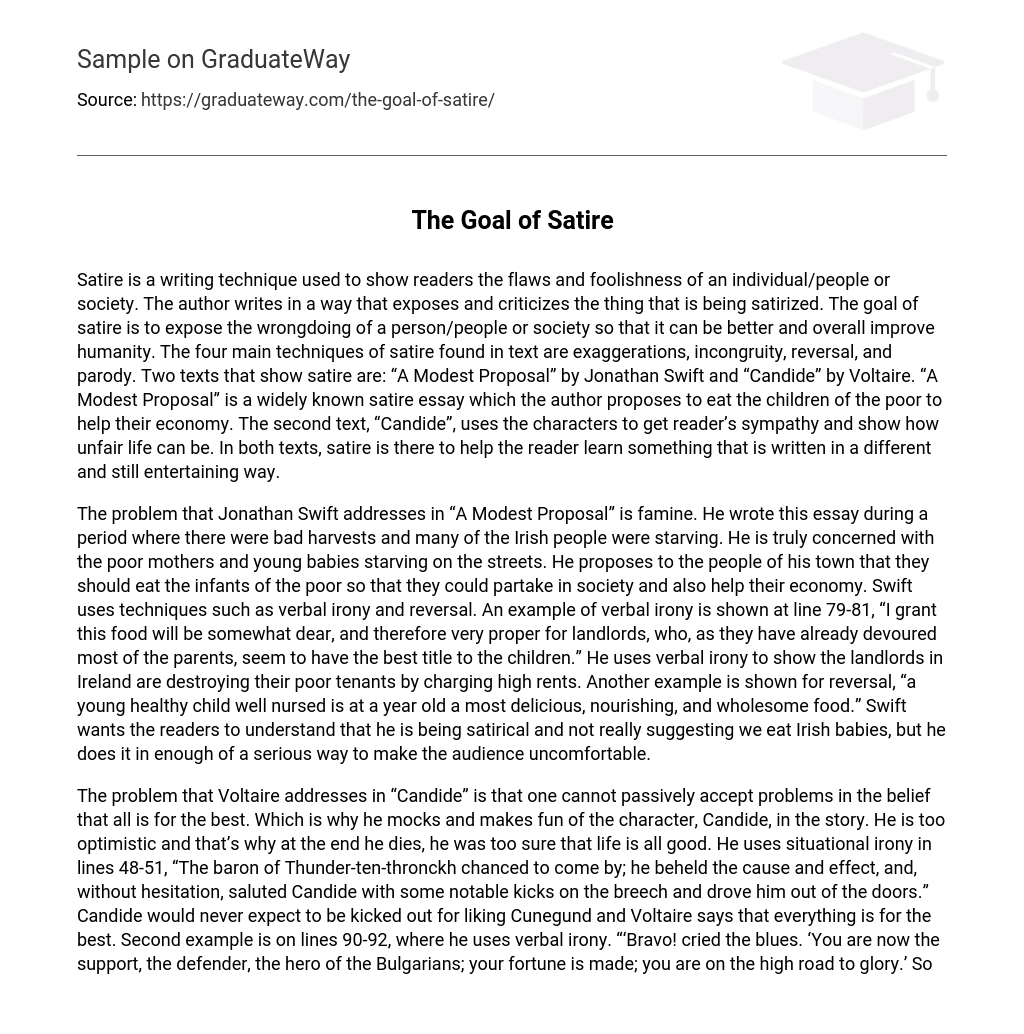Satire is a writing technique used to show readers the flaws and foolishness of an individual/people or society. The author writes in a way that exposes and criticizes the thing that is being satirized. The goal of satire is to expose the wrongdoing of a person/people or society so that it can be better and overall improve humanity. The four main techniques of satire found in text are exaggerations, incongruity, reversal, and parody. Two texts that show satire are: “A Modest Proposal” by Jonathan Swift and “Candide” by Voltaire. “A Modest Proposal” is a widely known satire essay which the author proposes to eat the children of the poor to help their economy. The second text, “Candide”, uses the characters to get reader’s sympathy and show how unfair life can be. In both texts, satire is there to help the reader learn something that is written in a different and still entertaining way.
The problem that Jonathan Swift addresses in “A Modest Proposal” is famine. He wrote this essay during a period where there were bad harvests and many of the Irish people were starving. He is truly concerned with the poor mothers and young babies starving on the streets. He proposes to the people of his town that they should eat the infants of the poor so that they could partake in society and also help their economy. Swift uses techniques such as verbal irony and reversal. An example of verbal irony is shown at line 79-81, “I grant this food will be somewhat dear, and therefore very proper for landlords, who, as they have already devoured most of the parents, seem to have the best title to the children.” He uses verbal irony to show the landlords in Ireland are destroying their poor tenants by charging high rents. Another example is shown for reversal, “a young healthy child well nursed is at a year old a most delicious, nourishing, and wholesome food.” Swift wants the readers to understand that he is being satirical and not really suggesting we eat Irish babies, but he does it in enough of a serious way to make the audience uncomfortable.
The problem that Voltaire addresses in “Candide” is that one cannot passively accept problems in the belief that all is for the best. Which is why he mocks and makes fun of the character, Candide, in the story. He is too optimistic and that’s why at the end he dies, he was too sure that life is all good. He uses situational irony in lines 48-51, “The baron of Thunder-ten-thronckh chanced to come by; he beheld the cause and effect, and, without hesitation, saluted Candide with some notable kicks on the breech and drove him out of the doors.” Candide would never expect to be kicked out for liking Cunegund and Voltaire says that everything is for the best. Second example is on lines 90-92, where he uses verbal irony. “‘Bravo! cried the blues. ‘You are now the support, the defender, the hero of the Bulgarians; your fortune is made; you are on the high road to glory.’ So saying, they put him in irons and carried him away to the regiment.” Candide expects to be on the “high road to glory” instead of being put in irons.
A satire points out problems, which can be done harshly, and still has value in public discourse. Making it sound harshly makes the thing being satirized easily understood because it’s the opposite of it. In conclusion, both these texts show satire and how effective it can be. It also teaches the readers something about life and society.





